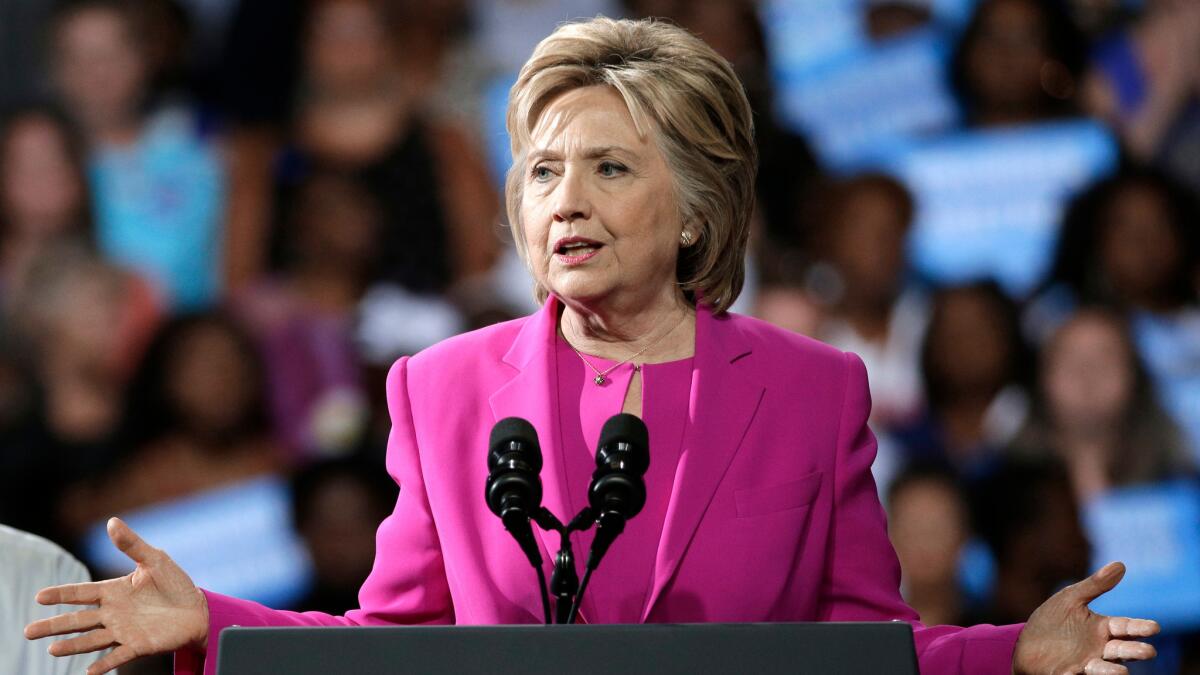Why the FBI concluded Hillary Clinton’s email practices did not rise to the level of criminal charges

Reporting from Washington — Federal law makes it a crime for a trusted U.S. official to “knowingly and willfully” disclose or transmit secret information to an “unauthorized person.” A second law makes it a crime to “remove” secret documents kept by the government or to allow them to be stolen through “gross negligence.”
Neither law applies clearly or directly to what FBI Director James B. Comey described Tuesday as Hillary Clinton’s “extremely careless” handling of classified emails that were sent through her private system when she was the secretary of State.
“It’s just not a crime under current law to do nothing more than share sensitive information over unsecured networks,” said Stephen Vladeck, a law professor at the University of Texas. “Maybe it should be, but that’s something for Congress to decide going forward.”
Comey made clear, Vladeck said, that “however much we might want federal law to make her carelessness a crime, nothing she did falls within the letter of the relevant federal criminal statutes.”
The laws protecting classified information go back to World War I and the need to protect military secrets from enemy agents. In recent decades, however, these laws have been used at times to prosecute officials who gave classified information to people who are not entrusted to have it.
The best-known recent case involved Army general and former CIA Director David H. Petraeus, who pleaded guilty to a misdemeanor for disclosing highly secret information, including the identities of covert agents, by giving it to his girlfriend, who was writing his biography. He was also accused to lying to the FBI during the investigation.
Sandy Berger, a former national security advisor under President Bill Clinton, also pleaded guilty to a misdemeanor for leaving the National Archives with classified documents hidden in his socks.
John M. Deutch, another former CIA director, narrowly avoided a misdemeanor charge for having taken hundreds of top secret files home on his laptop computer. He was pardoned by Clinton before charges were filed.
But none of those cases fit the peculiar situation whereby the secretary of State chose to bypass the department’s non-classified email system and instead relied on a personal server to handle her regular communications with her staff.
Hillary Clinton also used the department’s secure email system for transmitting classified information, but the FBI found that some of the regular communications with her staff on the personal server involved facts and details that she should have known were classified. In a few cases, the emails bore markings to indicate they contained classified information.
However, investigators did not find evidence she knowingly or intentionally disclosed government secrets or that she exposed secrets through gross negligence. Clinton’s apparent interest was in maintaining her privacy.
In the end, Comey, a deputy attorney general under President George W. Bush, said Clinton’s careless conduct fell short of a crime because there was no evidence of “clearly intentional and willful mishandling” of classified information and no sign of “disloyalty” or an effort to “obstruct justice.”
“In looking back at our investigations into mishandling or removal of classified information, we cannot find a case that would support bringing criminal charges on these facts,” Comey said.
The Espionage Act says it is a crime to improperly share or lose any document, writing or other military information through gross negligence. But prosecutors said they were unaware of any convictions based on gross negligence alone.
The FBI’s recommendation did not come as a surprise to lawyers who closely follow issues involving classified information. Many of them were surprised to learn of Clinton’s private email server, but they also thought it did not rise to the level of criminal offense.
Stewart Baker, a top national security lawyer in the Bush administration, called Comey’s statement “pretty damning for Secretary Clinton, even if the facts don’t make for an impressive criminal case. He suggests that she should have been, or arguably could still be, subjected to ‘security or administrative sanctions.’ What he doesn’t say, but what we can infer, is that she ran those incredible risks with national security information because she was more worried about the GOP reading her mail than of Russian or Chinese spies reading it. That’s appalling,” he said.
ALSO
Here’s the FBI director’s full statement on Hillary Clinton email investigation
Donald Trump blames a ‘rigged system’ for FBI’s recommendation not to charge Hillary Clinton
More to Read
Sign up for Essential California
The most important California stories and recommendations in your inbox every morning.
You may occasionally receive promotional content from the Los Angeles Times.











